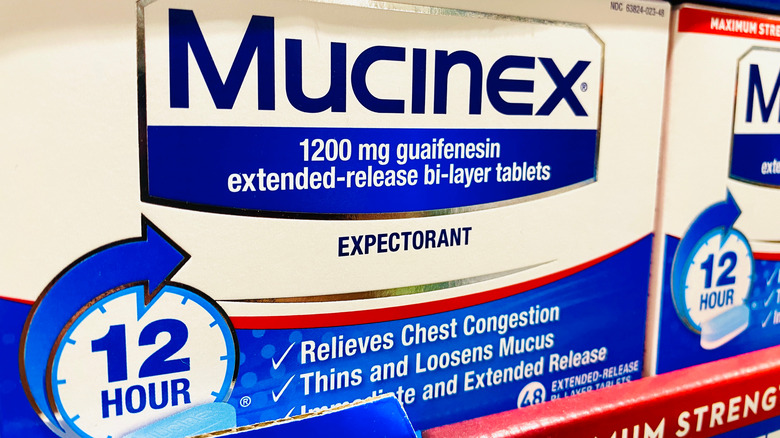When You Take Too Much Mucinex, This Is What Happens
We've all experienced some of the dreaded symptoms of a cold: runny nose, congestion, and cough. Many people turn to Mucinex, an over-the-counter medication used to relieve chest congestion, to feel better. According to Verywell Health, the generic name of Mucinex is guaifenesin, which is also the medication's active ingredient. The medication is an expectorant, so it's designed to break up and loosen your phlegm or mucus. It's available in different forms, like tablets or liquid, but all are designed to work the same.
Determining just how much you need to take to feel better depends on a few factors, like your age and the medication's form and strength. Medications like Mucinex are made for short-term use or until your chest congestion has cleared up, according to Verywell Health. It's important to follow your doctor's recommended dosage or the manufacturer's dosage to ensure it's working properly and safely.
Side effects of Mucinex
While side effects of a medication isn't necessarily a cause for alarm, taking too much Mucinex can lead to uncomfortable and possibly painful symptoms. According to Healthline, overusing Mucinex may result in severe symptoms, including nausea, vomiting, breathing problems, drowsiness, or seizures. It's also possible to develop kidney stones. Kidney stones can cause a person to feel feverish, chills, or a burning sensation while urinating. Drugs.com reports taking Mucinex improperly, like chewing a swallow-only tablet, can cause the medication to respond quickly instead of slowly as it was designed to. When too much of the medicine is ingested, you may experience adverse symptoms.
Using the medication as it's recommended can help prevent symptoms. However, taking too much can also lead to an overdose. If you take too much Mucinex and experience trouble breathing or feel faint, call 911 immediately (per WebMD). Severe side effects of Mucinex are typically only felt if the drug is misused or overdosed.


